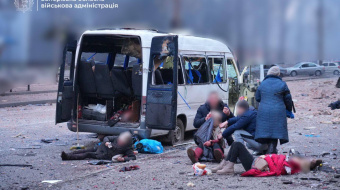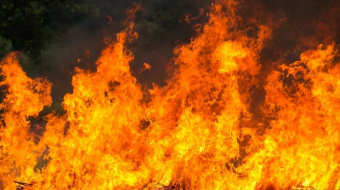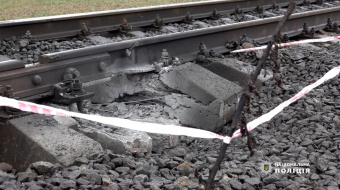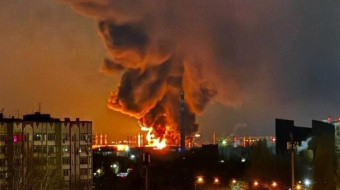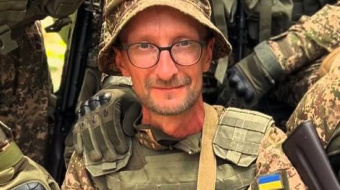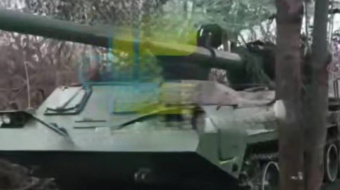Writer and professor Elena Styazhkina: Until proved otherwise, a citizen of the Russian Federation is the enemy. Part 1
Writer and professor Elena Styazhkina: Until proved otherwise, a citizen of the Russian Federation is the enemy. Part 1
The professor considers that a presumption of guilt is in force concerning all Russians. She admits this is not the humanist tradition, but it so happened.
"There are other people live, they would interfere us" - it is still spoken so about Donbas. Professor of Donetsk University believes that trying to shield themselves from the "Donetsk people", Ukrainians nurture trouble for years.
The city where the voices of patriots are no longer heard, but that is still Ukraine. So Donetsk is for a writer and historian Elena Styazhkina which two years ago, like many others, had to leave its native city being plunged into the abyss of separatism. She accepts only one scenario of all possible for the future of Donbas: the liberation and liberation. The writer is sure, this must be the request for which the entire resource of the good of Ukrainians should run and just such a victory must be at the end the war with evil to prevent it in the future.
"I hold my city by the hand"
- A year ago, you said that you can not release Donetsk and let it go. Now, after another year, did it?
- I think the issue is not about me. This is a question to us all: Are we ready to release? And what does it mean "to release"? A "concrete wall", "border", "other people live there that would interfere with Ukrainian reforms"; this "let go" scenario that first inflames, and then fades. But it is impossible to recognize that it does not exist. It has everything: a personal pain, a fatigue, a thirst for punishment, and unlearned lessons of the Second World War. But the main thing in it is the Kremlin's offscreen laughter. Ultimately, it is not ours but his idea to create an image of "those bad people" and using them to continue the aggression against Ukraine. With releasing and fencing by "concrete wall" we ourselves carry the bricks to that wall, and the propaganda lies about a "civil war in Ukraine" would nurture troubles and hatred for years to come.
Before we talk about the "release", it is necessary to go through the realization that those lands and people are under occupation, they lost not only the social, economic, political, and also informational subjectivity. To understand that all of those statements of collaborators, their parades, demonstrations, "the lessons of patriotic education" in schools are neither more nor less than the portions of the poison used to intoxicate the minds of people which are both in the occupation, and in the rest of Ukraine. To understand that all of that "will disappear like dew in the sun" (words from the anthem of Ukraine) as soon as the border between Russia and Ukraine will be closed, and the supply of Russian weapons and TV propaganda will be closed with it. Now, if to understand that we could release both hatred, and vain expectation syndrome. But to turn on realistic, and pragmatic expectations instead. For information on how to recover, how to get reparations, how to treat, how to teach, and how to defend.
- And if we talk about personal choice to "release"?
- Many people who managed to evacuate have made this choice. Their lives will no longer be associated with either Donetsk or Luhansk. Will not be even after those liberation. Having gone through and survived after arrival of Russian "defenders" and a betrayal of their local collaborators, many people have lost trust in the world, to that was considered and called as "home". This is something that probably could not be, nor need to be restored. Life came to the correct track. People find themselves and their place in different cities and different regions. It's good.
But this is a problem for the future of Ukrainian Donetsk and Luhansk regions. It will be very difficult to work hard to restore the liberated land without people, without their power, faith, talent, and willingness. Right now you need to think about how to make up for the loss of active and good people who will not come back.
As for me, I will not let go my native city. I do not care how it looks from the outside and what others think about it. It is important for me to hold it by hand, and know that even being such weakened and slandered by occupiers it also holds me.
- What has appeared to be the most difficult and painful for you after moving from Donetsk?
- Difficult was to understand what I personally can do for the liberation of our land. And painful were and still are debates about that "it's for ever", "close with a concrete wall", "return not at our lives". Now when our civil movement "Liberation. Return. Education" has formed, it is much easier to us. We try to work out the rules of return which should include mechanisms of forgiveness and punishment mechanisms, and providing a platform that will give the energy of the common goal. Education is one of the key positions of liberation of Donetsk and Luhansk regions.
- A few years ago, even before the events in the Donetsk and Luhansk regions, you have delivered a lecture about toxic shame. Can this term be used to explain what is happening in Donetsk and other occupied territories?
- Toxic shame is a psychological concept. This is a story that, for a variety of reasons, a person believes that he or she is not worthy of anything, that anything is impossible for he or she, that he or she is the worst of all, no matter what has been made. The concept of toxic shame with good reasoning and analysis can be introduced into the process of understanding who and what the Soviet people were.
But it is not enough to explain the lives of those who appeared in the occupied territories. War is such a story where the choice between good and evil is made at every moment. And it is made in threatening circumstances. Zigzag is a felicitous word to understand this, but it is very difficult to conceptualize because one and the same person can turn out to be a coward and a hero on the same day of his or her life. Nobody knows on what scales it can be measured.
The Stockholm syndrome, strategic immorality, the banality of evil, "war is when one figths to the last ditch and another gets rich" ... But the banality of the good, too. And, unprecedented and unexpected courage of any person. Do you read the blog of Fashik Donetskiy? This man lives in the occupied Donetsk. He not only never gave up, but he also "bears" on himself, on his faith in the victory those many who ready to despair and lose heart.
nv.ua
New service "Explain Ukraine". This is a daily mailout of three articles which were written about the situation in the Donbas by Donbas journalists and translated into English. Honest vision of people who work in the field is unbiased and fresh which is crucial in the world which is full of desinformation and propaganda. We try to share this vision in out daily mailout. You can subscribe here.










